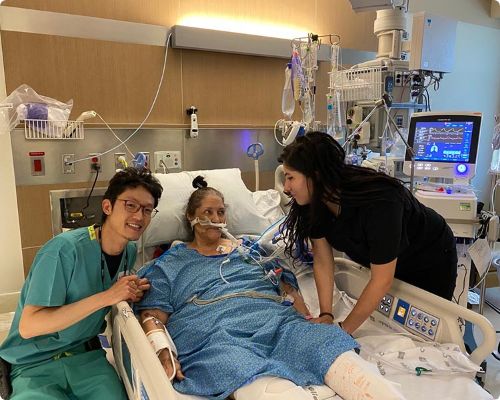I stumbled upon Kali’s podcast midway through my anesthesia critical care fellowship in February 2021. At our institution, I got the impression that patients in the ICU either got better on their own or had a prolonged and complicated course to LTAC or death. In her podcast, Kali explained that LTAC was rarely the outcome for patients in the Awake and Walking ICU in Salt Lake City.
Their ICU survivors hardly ever got trached, PEGed, or sent to LTAC, and literally walked out of the hospital in condition as close to their previous health as they could be. Although the concept of using no sedation on ventilated patients was completely foreign to me, it made sense based on what I had read in the literature. I devoured all of the episodes from the beginning, many of them bringing tears and regret for my ignorance, followed by inspiration and hope in later episodes. Listening to her podcast has been one of the most profound experiences in my short, eight-year career in medicine.
After discovering the no sedation, early mobility practice at the Awake and Walking ICU, my focus shifted to bringing it to my own institution. I visited Salt Lake City in March to witness it with my own eyes. Since then, I’ve been in touch closely with Kali and Louise to learn the practical approaches to sedation wean and sedation avoidance for newly intubated patients in the ICU.
Implementation has been challenged by pushback at the bedside, but knowing how most patients can be off sedation and comfortable allowed me to advocate for the patients. So far, four patients were successfully kept off of sedation after getting intubated, and two of them immediately smiled at me as they woke up from induction meds. Kali and the members of the Awake and Walking ICU have decades of experience in this approach.
Some institutions, such as Johns Hopkins, have implemented this as their hospital-wide QI project. If you are interested in improving patients’ lives beyond survival, I highly recommend listening to the podcast and reaching out to Kali for further guidance. If this concept is new to you, as it was for me, it will broaden your perspectives in taking care of your ICU patients, and perhaps renew the sense of purpose in your everyday practice.


 I stumbled upon Kali’s podcast midway through my anesthesia critical care fellowship in February 2021. At our institution, I got the impression that patients in the ICU either got better on their own or had a prolonged and complicated course to LTAC or death. In her podcast, Kali explained that LTAC was rarely the outcome for patients in the Awake and Walking ICU in Salt Lake City.
I stumbled upon Kali’s podcast midway through my anesthesia critical care fellowship in February 2021. At our institution, I got the impression that patients in the ICU either got better on their own or had a prolonged and complicated course to LTAC or death. In her podcast, Kali explained that LTAC was rarely the outcome for patients in the Awake and Walking ICU in Salt Lake City.
